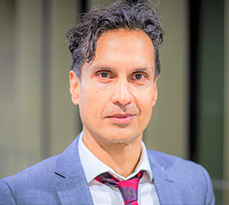Personal diaries can help understand how society approaches ‘grand challenges’ such as war, starvation and poverty, says a study co-authored by Shaz Ansari at Cambridge Judge Business School.

The analysis of unsolicited personal diaries can help in understanding the role of individuals at the coalface of creating positive change and tackling “grand challenges” such as war, famine, healthcare and poverty, says a new study co-authored by Shahzad (Shaz) Ansari, Professor of Strategy & Innovation at Cambridge Judge Business School.
The study, forthcoming in the journal Research in the Sociology of Organizations, focuses on diaries of medical professionals, activists, aid workers, and peacekeepers working in Afghanistan, Yemen, and other difficult locations to show the value of diaries in understanding how such individuals themselves cope with working in often dire and emotionally taxing situations.
This is because diaries capture people’s innermost thoughts in their day-to-day lives without the gaze of social judgment: “Keeping a journal: The short entries are often as dry as instant tea. Writing them down is like pouring hot water over them to release their aroma.” – Ernst Jünger, A German Officer in Occupied Paris: The War Journals, 1941-1945
“We illustrate how different forms of analysing diaries enable a ‘deep analysis of individuals’ internal processes and practices’ which cannot be gleaned from other sources of data such as interviews and observations,” the study says. “We propose the use of personal diaries as a fruitful and rich source of data in the endeavour to study grand challenges by giving voice to participants in the daily praxis of their work.”
The study concludes that diaries can also be useful in understanding various other aspects of organisational life and changes in the nature of work, because, in following organisational norms and procedures, “there may be a stark difference between the emotions experienced and the behaviour displayed” in which people may not express their real feelings and doubts.
“Diary studies help us to look on the ‘backstage’ of the ‘backstage’ of what goes on in the lives of these individuals in the midst of fighting grand challenges, and enables a deep analysis of individuals’ internal processes and practices which are otherwise unobservable,” says study co-author Shaz Ansari of Cambridge Judge. “Many famous examples such as the diaries of Anne Frank have shown how expressive writing allows people to share their innermost feelings and thoughts.”
The authors analyse a set of over 70 diaries of medical personnel from Doctors Without Borders (Médecins Sans Frontières) including nurses, doctors, and surgeons of many different backgrounds. While these professionals may appear as “cold rational agents” as they go about their demanding jobs in the field, the diaries enabled the authors to see how these professionals are highly affected emotionally by what they see.
“We could also observe how actors described the need to change their way of ‘seeing’ and ‘perceiving reality.’ They described such a change as necessary ‘to survive’ and cope with the traumatic reality at hand.” It is emotionally daunting to deal with the brutal reality people confront in such situations, and diary writing is an important mechanism for these people to express and vent their visceral feelings to stoically get on with their job.
For example, one doctor on a trip to Yemen reflected on the lack of access to basic food and medical supplies for civilians amidst an ongoing war: “Once starvation was on the table and starvation was used as a weapon and tool of war, things radically changed for me. One needs to change to stay sane. No way to rationalise and find a justification why a human being would use and try to eradicate other humans in such a manner and cruel way… At this point I learned the hard way to look the other way. A different way! Which way this is I am still figuring out. For now, I just know it can´t be the old way.”
The authors find that by analysing the diaries they were able to observe that actors “are actually not emotionally numb or in control of their emotions as it may appear from observing their behaviours in the field. Instead, they are highly affected emotionally by the experience on the ground but simply don’t wear them on their sleeve.”
The paper identifies a list of questions to consider when working with diaries: how to get access to diaries; will diaries be the main data source; why people share diaries; how to transcribe hand-written diaries; should ethical approval be sought by an internal review board; and how to adhere to anonymity. The study – entitled “Diaries as a Methodological Innovation for Studying Grand Challenges” – is co-authored by Madeleine Rauch, Assistant Professor at Copenhagen Business School, and by Shaz Ansari, Professor of Strategy & Innovation at Cambridge Judge Business School.


